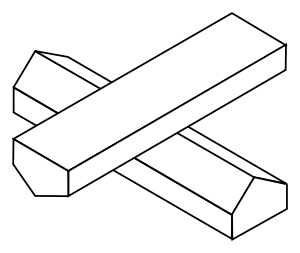Gold crosspoint
Contents
Description
An electrical gold crosspoint contact is made of two narrow gold-alloy or gold-plated members in a crosswise arrangement such that contact is guaranteed to be quickly made in a single point, with only little grinding, short bounce times and low contact resistance. The smallness of the contact area permits only low currents, limiting the application to the switching of small signals. Such cross contacts can be constructed either directly by shaping the contact members as rods or ridges and arranging them crosswise (as it was done for the Siemens STB switches) or indirectly by attaching a tiny metal strip or prism to each of the contact leaves such that these strips are arranged crosswise (as it is typical for Cherry switches).
The cross contact concept is known since the early days of electromechanical engineering. Also the allegedly "Cherry design first" golden prisms trick is an old one. In 1930, Western Electric filed three patents on the manufacturing of such contacts.[1]
Trivia
- In their 1973 and 1974 Switches & Keyboards catalogues, Cherry refer to gold crosspoint as "Another CHERRY design first" and to the technology as 'Gold "Crosspoint" Contact Switch'.
- Omron refer to the contact shape as "crossbar contact"[2], wheras RAFI simply say "cross contact"[3].
- The packaging of the Cherry G80-1800-based Raptor Gaming K1 refers to it employing "Gold Crosspoint Cherry"-technology, which is true: the keyboard uses Cherry MX Black switches
Switches using gold-alloy or gold-plated prisms
- Cherry gold crosspoint, Cherry M8, M9, MX, ML
- Cherry matrix keyboard
- RAFI RS 74 M and RS 76 M (nonlatching variants, only)
Gallery
Gold-tipped prisms visible on the contacts of this Cherry M6(?) switch
Gold prisms on the RAFI RS 74 M
Cherry MX gold "crosspoints"
References
- ↑ Western Electric Co., US patent 1907930, US patent 1907931, US patent 1907932, all filed 1930-11-24.
- ↑ Omron — Further Information of Basic Switches Technical Guide for Basic Switches. Retrieved 2015-09-11.
- ↑ RAFI — PCB Switch catalogue. Retrieved 2015-09-11.




